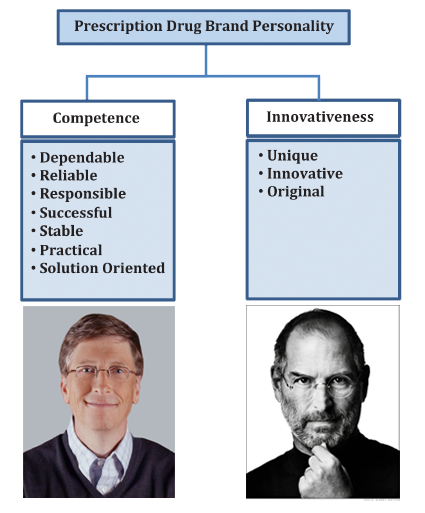Rx Drug Personalities Perceived by Consumers Boost sales and develop direct relationships with consumers by imbuing Rx brands with human characteristicsPharmaguy interviews Lea Katsanis, PhD, Marketing Professor at Concordia University’s John Molson School of Business (see Bio), about her research into Rx brand personalities as perceived by consumers and how pharmaceutical companies can boost sales and develop direct relationships with their consumers by imbuing their brands with human characteristics.
Aired LIVE on: Wednesday, February 19, 2014
Find Additional Business Podcasts with Pharmaguy on BlogTalkRadio
You also can visit this Pharma Marketing Talk Segment Page and listen to the live show or the archived audio podcast afterward. This show and ALL Pharma Marketing Talk shows are available as podcasts via PMT on iTunes (FREE!).
BackgroundIs your product Competent (i.e., does it have a “Bill Gates” persona) or Innovative (i.e., does it have a “Steve Jobs” persona) or both?
New research from Concordia University’s John Molson School of Business shows that Big Pharma has begun embracing “brand personality,” a marketing strategy traditionally employed by consumer-focused companies like Apple, Coca-Cola and Harley-Davidson.
By 2018, it is estimated that the global pharmaceutical market will be worth more than $1.3 trillion USD. To corner their share of profits, established drug companies have to fight fierce competition from generic products, adhere to stringent government regulations and sway a consumer base that is better informed than ever before.
“Brand personalities can transform products from being merely functional to having emotional value in the eyes of the consumer,” says marketing professor Lea Katsanis, a co-author of the study that recently appeared in the Journal of Consumer Marketing.
“Pharmaceutical companies give their brands personality traits by relying on physical attributes, practical functions, user imagery and usage contexts. As a result, brand names like Viagra, Lipitor and Prozac become shorthand for the drugs themselves.”
Prescription drug brand personality, as perceived by consumers, has two distinct dimensions: competence and innovativeness.
Consumers typically applied terms such as “dependable, reliable, responsible, successful, stable, practical and solution-oriented” to branded drugs, thus showing a preference for overall competence. Words like unique, innovative and original related to the “innovativeness” of the drug in question.
“Our findings can help marketers better understand how competing brands are positioned and act accordingly to ensure their products remain distinctive. One way of achieving this could be to appropriately focus more on either the competence or innovativeness dimensions,” says Katsanis.
“From a consumer perspective, prescription drug brand personality may make health-related issues more approachable and less intimidating, facilitating physician-patient interactions by making patients more familiar with the medications used to treat what ails them.”
Questions/Topics of Discussion
- What is brand personality and why is it important?
- Why can Rx pharma brands now be considered similar to consumer brands?
- Briefly describe your research and your results.
- How are these results relevant to practicing industry marketers? What is the takeaway from your work?
- Is there any downside to brand personality? For example, does it have the potential to be misused by marketers?
Guest Bio
 Lea Katsanis is a marketing academic with significant university teaching, research, and administrative experience. Teaching and research interests include healthcare and pharmaceutical marketing, branding and brand management, advertising, social marketing, personal selling and sales management. Administrative responsibilities included Director, MBA Program and two full terms as Chair, Department of Marketing. Scholarly work published in Journal of Product and Brand Management, Journal of Consumer Marketing, the Journal of International Consumer Marketing, Journal of Pharmaceutical Marketing and Management, Health Management Quarterly, and International Marketing Review, among many others. Other professional activities include positions on the Editorial Advisory boards of the Journal of Product and Brand Management and the Journal of Consumer Marketing. Formerly a marketer in the domestic, international, and subsidiary divisions of leading Fortune 500 and European corporations with extensive experience in Market Research, Sales, Strategic Planning, Product Management, Product Licensing and Development, and Marketing/Sales Training. Acts as a marketing consultant for the pharmaceutical, food and retail industries in the areas of branding, advertising, sales, and intellectual property (patents and trademarks). Makes frequent appearances as a marketing expert in the media and at industry and governmental events. Degrees include A.B. in Economics from Vassar College, an M.B.A. in Management from New York University, and a Ph.D. in Marketing and International Business at George Washington University.
Lea Katsanis is a marketing academic with significant university teaching, research, and administrative experience. Teaching and research interests include healthcare and pharmaceutical marketing, branding and brand management, advertising, social marketing, personal selling and sales management. Administrative responsibilities included Director, MBA Program and two full terms as Chair, Department of Marketing. Scholarly work published in Journal of Product and Brand Management, Journal of Consumer Marketing, the Journal of International Consumer Marketing, Journal of Pharmaceutical Marketing and Management, Health Management Quarterly, and International Marketing Review, among many others. Other professional activities include positions on the Editorial Advisory boards of the Journal of Product and Brand Management and the Journal of Consumer Marketing. Formerly a marketer in the domestic, international, and subsidiary divisions of leading Fortune 500 and European corporations with extensive experience in Market Research, Sales, Strategic Planning, Product Management, Product Licensing and Development, and Marketing/Sales Training. Acts as a marketing consultant for the pharmaceutical, food and retail industries in the areas of branding, advertising, sales, and intellectual property (patents and trademarks). Makes frequent appearances as a marketing expert in the media and at industry and governmental events. Degrees include A.B. in Economics from Vassar College, an M.B.A. in Management from New York University, and a Ph.D. in Marketing and International Business at George Washington University.









![6 Digital Tools at the Center of Healthcare Digitalization [INFOGRAPHIC]](http://ec2-54-175-84-28.compute-1.amazonaws.com/pharma-mkting.com/wp-content/uploads/2021/04/6DigitalTools_600px-100x70.jpg)




